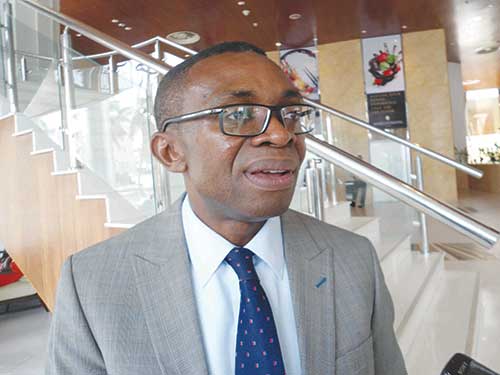The country’s dire economic situation concentrated minds at a breakfast parley the Nigeria Economic Summit Group (NESG) organised with the business community in conjunction with the Central Bank of Nigeria (CBN).
CBN Governor, Godwin Emefiele, sought understanding of foreign and local investors, and urged them not to panic, saying the fall in oil price, naira value depreciation, and other economic challenges are global and not limited to Nigeria.
Against this backdrop, TheNiche spoke with a participant at the parley, Ike Chioke, Managing Director and Chief Executive Officer of Afrinvest West Africa, who had warned previously that the CBN may not rescue any failed bank.
Chioke, a research analysts and investment banker issued a report in October last year which said the CBN would not get involved in a bailout because of its liquidity situation.
In spite of Emefiele’s latest assurance that the country will survive the current challenges even with a $10 billion external reserves, Chioke insisted that the CBN would not be able to rescue any bank that fails now.
Thoughts on CBN bank bail out as oil price slump poses default risks
The CBN does not want to create another kind of AMCON (Asset Management Corporation of Nigeria). From the experience of 2008 and 2009, the CBN is much better prepared to forestall such an incident from happening again.
That is why you see the CBN being proactive in trying to manage the banks and giving them guidance as to the measures they are to take to ensure the stability of the Nigerian economy amid global oil price decline, the attendant fall in commodity prices globally.
Geo-political tensions are causing some of it. Some of it is driven by over-supply of Shale oil in the United States. The Saudis say ‘we keep on pumping because we don’t care. We want to take out all those Shale producers.’
And Russia needs money, so they are selling oil at any price they can get. These things sometimes will affect a small player like Nigeria.
The CBN is proactively making sure all the stakeholders are informed about what they are doing to defend and protect our economy, to make sure we don’t end up having to bail out another bank. Clearly, if they have to bail out another bank in a severe financial crisis situation like now, it will be much more challenging.
Frankly, from the experience of the past, I don’t think there is any bank in that sort of situation at the moment. Indeed the first recourse will be for the shareholders of the bank to bail themselves out before they come to the CBN.
J.P Morgan has threatened to remove Nigeria from its emerging market index. Can the CBN resolve investors’ concerns over the economy?
To say whether the assurance of CBN can resolve the whole concerns, that is a very strong word. I think it can ameliorate some of the concerns and it was very reassuring indeed to see [Emefiele] explaining the causes of the so called demand for forex [foreign exchange].
If I am used to experiencing, maybe $200 million of demand every week, typically, this time of the year in January and I have statistics going back 25 years, when just for the growth of the economy it should be about $200 demand of forex every week, so in the whole month maybe $800 billion.
If suddenly I come to the month and I see people saying they need $2 billion of forex in January and thinking, this man that used to import one cargo of milk now wants to take 10 cargos at once, since you know he was doing one cargo in one shipment, why is he taking 10 cargoes in one shipment?
How is he going to offload it, what warehouse do you have to store it? Those are some of the things the CBN is saying.
When you track some of those documentation they submit, you see that it is frivolous. They are people finding a way to hoard dollars because their thinking is, if I buy today, it will be cheaper then I can sell it to someone else in the future. This is what is called speculative activity and if you encourage that, there is no end to it.
It can drag the economy to the ground, so, the CBN is reassuring us that it would try and clean out all the people doing such transactions that are not in the best interest of the Nigerian economy, either by dealing with the people themselves who are giving all those fake document or dealing with the banks aiding and enabling them.
They have assured us that there is enough dollars. The $44 billion in external reserves is more than three times higher than the worst case scenarios we had in the past. There was a time we had $10 billion and we had financial crises and we still got over them. That is why I am saying that [Emefiele’s] statement is very reassuring.
At the same time, investors may be worried because there are still other issues that colour the climate. It is not just economic problems that we are facing. We are also having a political issue because there is an election, and election times also have implications on spending and driving up inflation.
Amid the election problem, there is the fact of insecurity. There is also prevalance of corruption which creates a lot of inefficiency in the economy like ours. So, as we are trying to clean up and restore sanity in the monetary policy side, which is what the CBN is doing, it is almost like trying to use a broom to sweep back water coming from the Atlantic ocean because the fiscal side is even where you start trying to solve the problem and to impose some discipline and transparency.
Some of these things, if done appropriately, will make Emefiele’s job very easy.
Do you foresee CBN adjusting interest rate down to a single digit?
The measures Emefiele is taking at the moment have been to drive up interest rate. So, we have seen the NPR drive up from 12 per cent to 13 per cent although they held it steady at the last NPC meeting. This is actually counter to his original statement in the middle of last year when he assumed office.
However, the CBN needs to think of the fundamental policy change in perception as to whose money count more for driving the growth of Nigeria’s economy.
What I mean by that is this: there is a lot of money in Nigeria as the CBN tells you all the time. They tell us there is a lot of liquidity in the system. So we are trying to control the liquidity, and that clearly tells you there is money for investment purposes.
But the challenge with the Nigeria economy is that it is fundamentally designed for rent seeking; it encourages someone to buy dollars today at maybe N170 or N180 and try to sell it tomorrow at N190. It doesn’t have to do any productive activity, you see what I mean.
So, why bother to invest and wait two years to make 10 per cent returns when I can just do some forex transaction and get 10 per cent in two months? That is the problem with the Nigerian economy. It is also the same thing in some areas of the economy that is outside the control of the CBN.
That is why I am saying that solving the problem is by looking at the fiscal side of it and all those issues like importing petroleum products to bringing kerosene. They are supposed to be subsidised at N50 for end users, but at what do you buy it?
Speculating activity means that someone can put N1 billion to work in that area and comes out with N3 billion extra if it is N50 to N150. There is no incentive for him to invest.
So, the more you clean out all these inefficiencies in the broader economy the more you can design measures to persuade the people who have money here to invest for the long term. Because, then you can bring interest rate down to 8 per cent and they know that by keeping their money in the bank maximally they can get 8 per cent.
But if they invest in manufacturing, they can do 20 per cent and that is easy. So, Emefiele is well intentioned and he needs the support of the rest of the government to achieve his objective of bringing interest rate down.
Banks’ exposure to oil sector loans
Well, you can’t take it as a general concern because they are exposed to oil sector loan. Some people might have gone to the oil sector loan in order to be hedged.
Remember, a lot of banks went to euro bond market and raised dollars. Often they make sure they don’t try to use naira asset to offset dollar liability; naira asset doesn’t match dollar liability. What they do is create a dollar asset on the other side.
To that extent they may lend to someone who is in the oil and gas up stream business who may be generating 10,000, 50,000 barrels per day for a project. If the price is $100 and they say ‘we are not going to lend you at the price of $100, we might discount it to $50 or $60 because the market may come down to $50 or $60, but here is the money because we know you are selling in dollars.’
That is why when the dollar is coming down they settle that exposure.
The fact that someone is in the oil and gas sector does not mean that the risk asset they created is bad. Actually, it could be a benevolent time for him to say that I’m glad to lend to that man because he is still the one that is earning dollars in this tight economy. Not all of them are bad.
Similarly, banks have learned from the challenges of 2008 to 2009 not to lend too much to importers of products to the point that if prices shift suddenly – ‘you know, I gave you money to buy product of $100’ – and by the time you bring it to Nigeria, it is now selling at $50, that means he has to crash the price to get a market for it. Banks have learnt from that experience. They still lend to oil and gas marketers but they do it in a more disciplined manner, and most of these individuals put their own money as well to the point that before this reduction in fuel pump price from N97 to N87, most of the down stream players were taking a huge margin.
Frankly speaking, the product was coming in far below $50 price per barrel and we were still selling at N97 per litre. Diesel price should be well below N90 per litre, let alone fuel.
Therefore, the fact that a bank has lent to such an oil and gas player does not mean that it is at risk. Instead, the man is making huge profits because the government has allowed it.
Maybe what the government should have done long before now is to deregulate the entire oil industry to stop marketers from making easy profit and to fundamentally reassure people like [Aliko] Dangote, who are building refineries and other people who have intention of investing in petro chemical industry refineries in Nigeria, that they will not make loss.
This is actually the best time to deregulate because we expect that in this 2015 oil price may still hover in the range of $40 to $50 per barrel. People may be used to deregulated price, you may increase supply and, hopefully, when the price starts picking up there will be more efficiency for the price to remain in that area.














